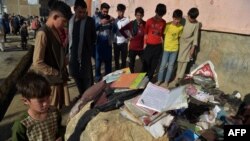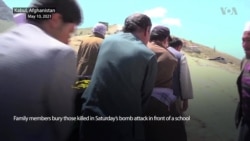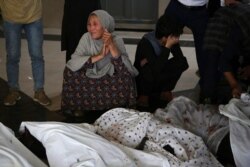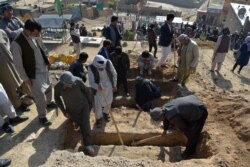The Taliban and the Afghan government announced a three-day cease-fire during the Muslim holiday of Eid al-Fitr, as residents of the Afghan capital, Kabul, mourned the deaths of dozens of schoolgirls who were killed Saturday in a bomb attack.
The attack outside Sayed Ul-Shuhada High School in the Dasht-e-Barchi area of Kabul killed at least 60 people, mostly schoolgirls, and injured 150 others.
"What did these innocent kids do to deserve this?" said Mohmmad Nasir, a Dasht-e-Barchi resident who lost his two daughters in the attack. "Those who committed the act should be ashamed."
Nasir told VOA he wants the warring parties to stop the violence so "children can get an education in a peaceful environment."
Mohammad Hakim, another Kabul resident, said, "The enemies cannot face our people on the battlefield, so they attack education centers and kill our people."
The Afghan government declared Tuesday a national day of mourning for the victims of the attack.
No group has claimed responsibility for the attack in the western neighborhood of Dasht-e-Barchi, where mainly Hazara Shi'ite Muslims live. On Saturday, Taliban spokesman Zabihullah Mujahid denied the group was involved, according to Reuters.
The area has witnessed several deadly attacks in recent years. Last year, an attack on a maternity hospital killed at least 24 women and children and wounded 16 others. The United States blamed Islamic State's Afghanistan affiliate for the attack, but the Afghan government said the Taliban were responsible.
Afghan officials also blamed the Taliban for the weekend attack, while the Taliban rejected any involvement.
"The Taliban are to be blamed," said Najib Azad, a Kabul-based political analyst, adding that the insurgent group claims to be the main armed group fighting against the Afghan government.
Azad said that until the Taliban agree to a cease-fire, they will be blamed for such attacks.
"If the Taliban agree to a cease-fire and if these major attacks are still carried out, then it will become clear that there is another party involved," he told VOA.
Holiday cease-fire
The Taliban announced Sunday a three-day cease-fire for the Eid al-Fitr holiday, which marks the end of the holy month of Ramadan.
The Afghan government said Monday that government troops will also observe a cease-fire during the holiday.
The government, however, called on the Taliban to agree to a permanent cease-fire and resume negotiations.
"If the Taliban are sincere in what they say, they should stop (the) violence and come to the negotiations," said Mohammad Amiri, a spokesperson for the Afghan president.
Abdullah Abdullah, chairman of the High Peace Council for National Reconciliation, stressed the need for a permanent cease-fire.
"We believe that the solution to the current crisis in the country is to speed up negotiations, declare a permanent cease-fire and end the war," he said Monday in a statement.
Violence has surged across Afghanistan in recent weeks. The Afghan government said fighting has intensified in seven provinces.
The Afghanistan Independent Human Rights Commission said Sunday that during Ramadan, which ends this week, at least 160 civilians were killed and 351 others were injured.
Global condemnation
The attack on the girls' school has been strongly condemned by leaders across the world.
In a statement on Saturday, United Nations Secretary-General Antonio Guterres denounced the attack, saying "those responsible for this heinous crime must be held accountable."
"The secretary-general underlines the urgency of ending the violence in Afghanistan and achieving a peaceful settlement of the conflict," he said in the statement.
The U.S. Department of State also condemned the attack, calling "for an immediate end to violence and the senseless targeting of innocent civilians."
The European Union's mission in Afghanistan called the killings "an attack on the future of Afghanistan."
Henrietta H. Fore, executive director of UNICEF, said in a tweet that violence against schools is "never acceptable," adding that, "schools must be havens of peace where children can play, learn and socialize safely."
Saturday on Twitter, Nobel laureate Malala Yousafzai, who was shot in the head by the Taliban in Pakistan while riding a school bus in 2012, called the attack "horrendous" and urged world leaders to "unite to safeguard school children."
"My heart is with the Kabul school victim's families," she said.








